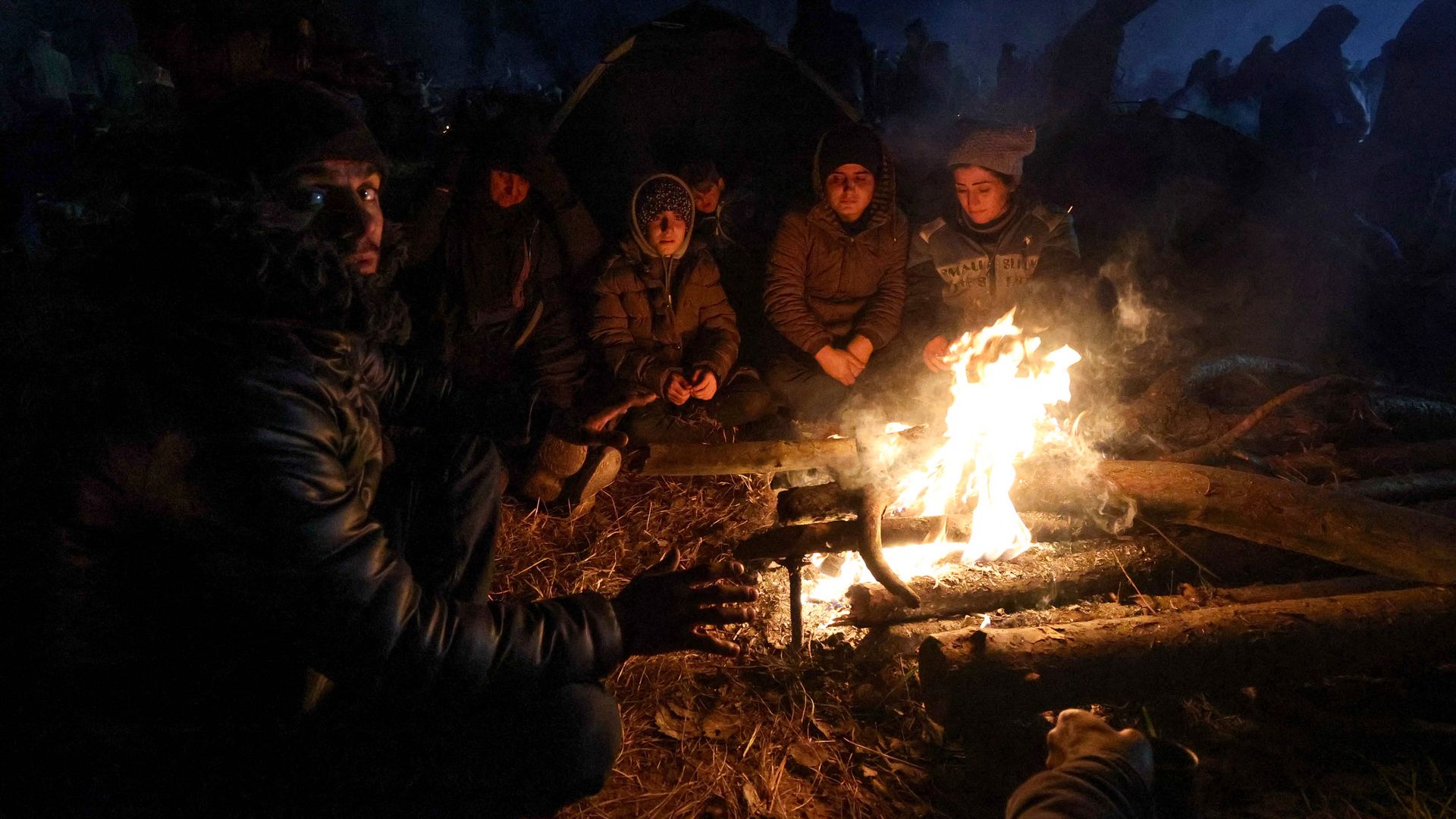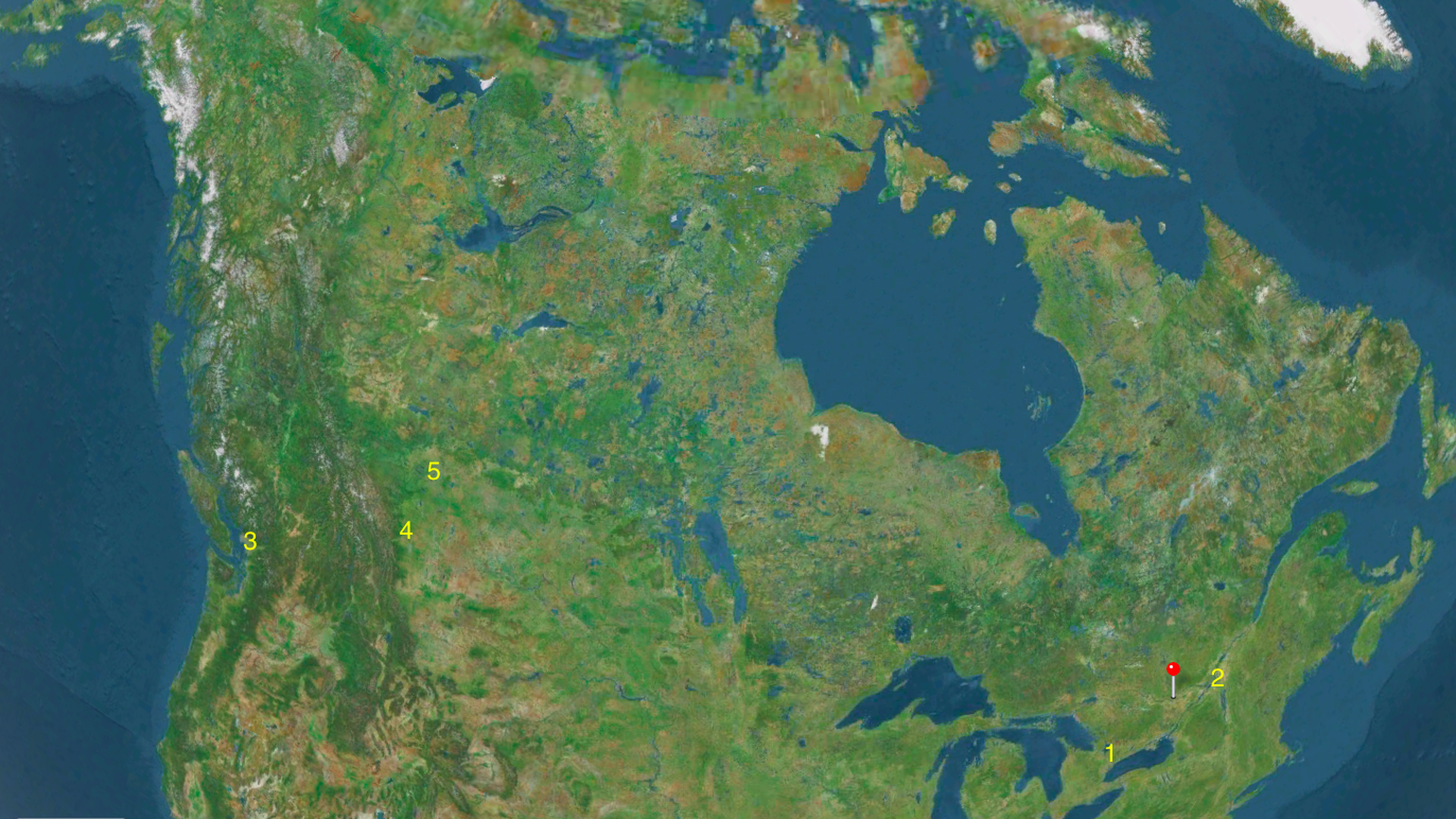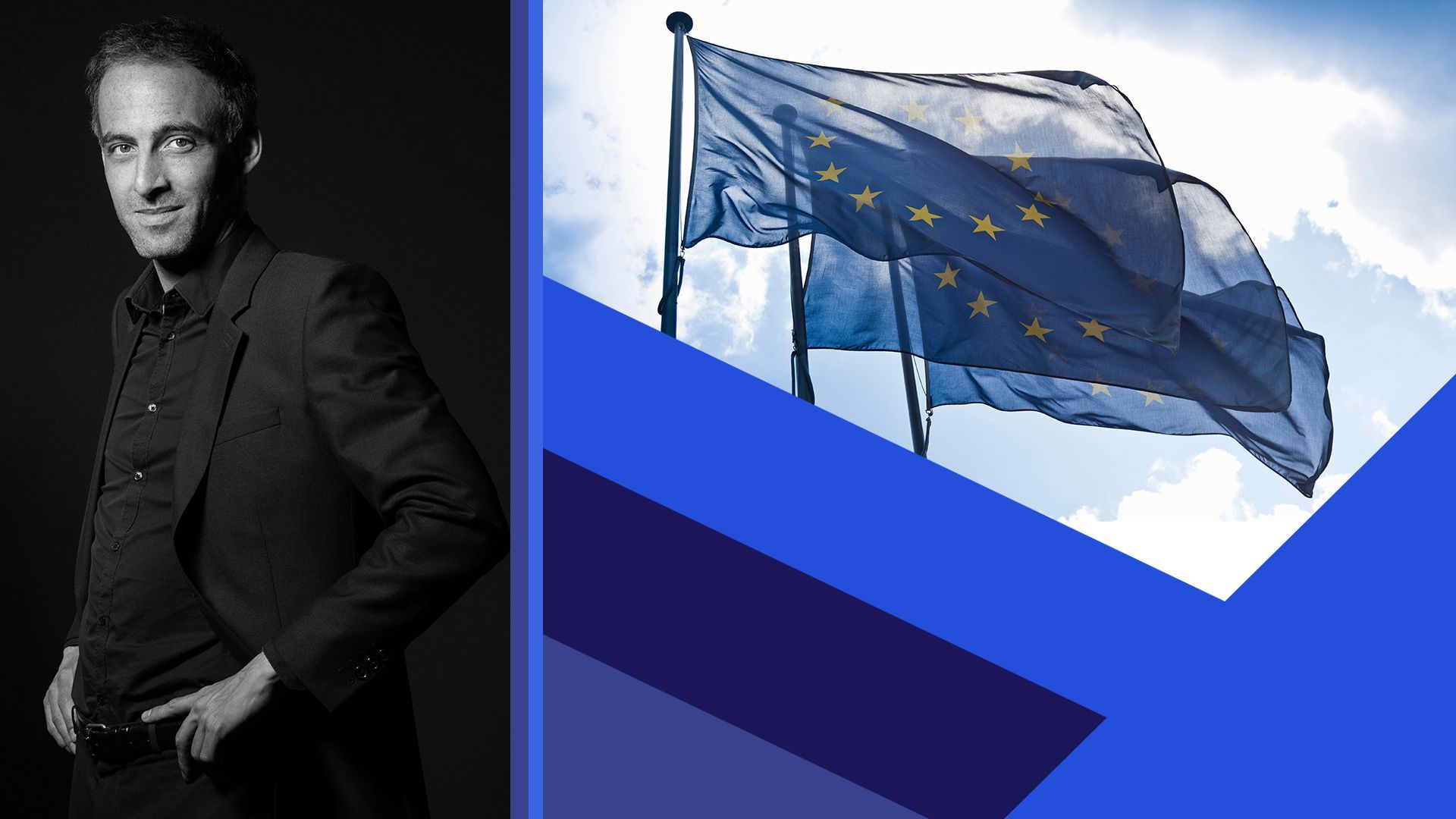| | | | | | | | | | | Axios World | | By Dave Lawler ·Nov 22, 2021 | | Welcome back to Axios World. - Tonight's edition (1,897 words, 7 minutes) starts… in a very dark place. Fair warning that the first story is not light reading.
- Heads-up: We'll be off Thursday for Thanksgiving. Thanks to you for being a reader. I'll be back in your inboxes on Monday.
New arrival? Subscribe. | | | | | | 1 big thing: Freezing on the EU frontier |  | | | Migrants warm themselves on the Belarusian side of the border. Photo: Maxim Guchek/BELTA/AFP via Getty | | | | Migrants are "dying in the snow" along the Belarus-Poland border, caught in freezing temperatures between hostile border guards from both countries and cut off from lifesaving aid, Stefan Lehmeier of the International Rescue Committee tells Axios. Setting the scene: Lehmeier spoke by phone with Axios today immediately after helping to administer first aid to three Iraqi men suffering from hypothermia in a forest on the Polish side of the border. Lehmeier and his fellow aid workers gave them blankets, hot soup and waterproof boots. - "We're really worried because it's getting so cold now that I don't think, even with the stuff we left them with, they'll have a good chance of survival," says Lehmeier, the IRC's deputy Europe director.
The big picture: EU officials accuse Belarusian dictator Aleksandr Lukashenko of waging "hybrid warfare" on the bloc — which has sanctioned Lukashenko for election-rigging and other abuses — by allowing thousands of migrants to travel from the Middle East to Minsk and then pushing them to the border. - Desperate to reach Poland and thus the EU, the migrants are "pawns in the hands of the Belarus forces," which choose when and how they attempt to cross, Lehmeier says, in some cases physically forcing people across barbed-wire barriers.
Polish authorities have responded by establishing an "exclusion zone" reaching up to 3 miles into Polish territory. Journalists and aid workers are barred from entering and, Lehmeier says, migrants discovered there are being illegally forced back to the border. - There have been cases of migrants crossing a frigid river to Poland and then immediately being forced back into the water when they reach the other side, Lehmeier adds.
- NGOs have established a hotline to dispatch aid to those who reach Poland, but the migrants "are so afraid of everyone that they only call someone to come to them — they only give away their coordinates, so to speak — if they know that if they don't do that, this will be the end," Lehmeier says.
- Border guards are "tracking us and harassing us," Lehmeier says. Meanwhile, volunteers from Poland's Territorial Defense Forces seem to be acting as vigilantes, he says, searching for refugees and puncturing the tires of the aid workers seeking to help them.
"There's a good chance that next spring or whenever this exclusion zone is lifted, local residents or border guards might go through this forest and find corpses everywhere." — Stefan Lehmeier State of play: On the Belarusian side of the border, officials cleared a large refugee camp in recent days and relocated around 2,000 people to a warehouse. - A few hundred Iraqis have boarded repatriation flights, many of them already having spent their life savings trying to reach the EU. Officials in Brussels are scrambling to stop additional flights to Belarus and are hoping Lukashenko may be backing down.
- Still, Polish officials contend that every night, Belarusian forces are pushing more migrants to the border.
On the Polish side, there seems to be no clear system for who is sent back across the border, who is taken to a detention center, and who might actually get to claim asylum, Lehmeier says. - "There basically is no rule of law right now here in the border zone," he says.
The big picture: The situation is representative of the EU's wider approach to migration at its external borders, Lehmeier notes, whether that be in the Mediterranean Sea or the Polish snow. Go deeper: The NYT on why Iraqi migrants are risking everything |     | | | | | | 2. The next phase of vaccinating the world |  Data: Our World in Data; Map: Kavya Beheraj/Axios We're approaching an inflection point where the biggest barrier to expanding access to COVID-19 vaccinations should no longer be vaccine hoarding in rich countries, but delivery in the poorest ones, Seth Berkley, CEO of the Gavi vaccine alliance, told Axios in an interview at Gavi's offices in D.C. What he's saying: "We had no supply, or very little supply, and it was slowly going up," says Berkley, who is also the point person on the global COVAX Initiative. "And, of course, the big concern has been the countries that were left behind." - "That supply is now coming in a big way, and so we will stop seeing supply as a barrier pretty soon, but then there will still be some countries that lag behind now and that's because of these bottleneck issues," Berkley says.
Breaking it down: One of COVAX's core goals for 2021 was ensuring that at least 20% of the population in every country was vaccinated. Around 60 countries are currently short of that mark, and 42 have yet to hit 10%, including most of Africa. - Berkley says most poor countries can absorb all the doses they're receiving, but when they run their weekly assessments "between 18 and 25 countries come up red."
The challenges range from shortages of supplies like syringes or health care workers to utilize them, issues with the "cold chain" needed to transport and store Pfizer and Moderna doses, vaccine hesitancy, or inadequate logistical planning, Berkley says. - In countries like the Democratic Republic of the Congo, where 0.1% of the population has had the first dose, it can be all of the above.
- Deliveries can also be unpredictable or arrive with little time before doses are set to expire. Among the 92 lower-income countries being supported by COVAX, half have used less than 75% of the doses they've received, according to an analysis from the COVID Global Accountability Platform.
What to watch: COVAX is working on a country-by-country basis to try to solve those challenges, Berkley says, whether that means sourcing equipment or sending in medical teams. - But COVAX is now starting to consider "readiness indicators" of each country's ability to distribute doses before shipping them, and he acknowledges that some countries with very low vaccination rates will only fall further behind in the coming months.
|     | | | | | | 3. Global news roundup |  | | | Casting ballots in Vallenar, Chile. Photo: Javier Torres/AFP via Getty | | | | 1. Sudanese Prime Minister Abdalla Hamdok is back in office, having been reinstalled Sunday by the military leaders who deposed him a month earlier. - What they're saying: Hamdok says he wants to prevent further violence and pave the way for elections by 2023. But leaders of the pro-democracy movement have denounced the deal as cover for continued military rule and said they'll continue their protests.
2. The first round of Chile's presidential election on Sunday set the stage for a Dec. 19 runoff between a far-right ex-congressman, José Antonio Kast, and left-wing former student leader Gabriel Boric, who received 28% and 26%, respectively. - Why it matters: The ultra-polarized election could have a profound impact on the future political course of Chile, which is also in the process of rewriting its constitution. Chile is relatively prosperous and stable, but deeply unequal.
3. Many Indian farmers who have protested for over a year are not satisfied with the fact that Prime Minister Narendra Modi has backed down and restored price floors for rice and wheat — they're now protesting to extend those protections to all produce, Reuters reports. 4. Unvaccinated people in Kenya will be denied access to many businesses, restaurants and government offices starting next month, Axios' Noah Garfinkel writes, even though just 5% of the population is fully vaccinated. The goal is to increase the pace of vaccination. |     | | | | | | A message from Axios | | Start a new daily habit. | | |  | | | | Every weekday morning, host Niala Boodhoo catches you up quick on the latest news and interesting stories you won't hear anywhere else. In 10 minutes, you'll hear the latest in everything from politics to space to race and justice. Listen now for free. | | | | | | Bonus: Where in the world? |  | | | Screengrab via Apple Maps | | | | Tonight we're heading to Canada and stopping in the capital (marked with a red pin) and the five largest cities. Can you name them? Scroll to the bottom for the answer. |     | | | | | | 4. Interview: EU's top China hawk calls German firms "lobbyists" for Beijing |  | | | Raphaël Glucksmann. Photo illustration: Annelise Capossela. Photo: Joel Saget/AFP via Getty Images | | | | The leader of the European Parliament's first official delegation to Taiwan tells Axios' Zach Basu the EU is slowly waking up to the threat posed by the Chinese government — but is held back by companies, particularly in Germany, that act as "lobbyists" for Beijing. Driving the news: Raphaël Glucksmann, a French human rights activist who has quickly become one of Europe's most influential voices on China, told Axios in a wide-ranging interview that he is seeking to "break the taboo inside the European institutions" on engaging with Taiwan. - Glucksmann, 42, dismissed the notion that this month's visit — which drew a stern warning from Beijing — was a "provocation," and he argued that stronger EU support for Taiwanese democracy will actually deter China from launching an invasion.
- "We should not be terrorized and paralyzed by the fear of authoritarian regimes' reactions to our policies," Glucksmann stressed.
Flashback: Glucksmann and four fellow European parliamentarians were placed on Beijing's sanctions blacklist in March for their advocacy over the genocide in Xinjiang. - In response, the European Parliament voted overwhelmingly to freeze ratification of a major EU-China investment deal.
- Glucksmann says there's "no chance" that deal will ever be passed, and he's pushing for the EU to upgrade its trade ties with Taiwan in its place.
- In the interview, Glucksmann warned that if the EU's executive branch wants to be "chickenshit on Taiwan," the European Parliament will hold it accountable by refusing to ratify other trade priorities.
Glucksmann says one major barrier to stronger European action on China is Germany, where he says political leaders have bet big on economic ties with China and companies like Volkswagen act as "ambassadors of Chinese interest." What to watch: Glucksmann said the EU's policies toward China will determine whether it can be an "adult player" independent of the U.S.: "If we don't manage to be stronger in our relation with China, then it means that Europe will remain weak forever." Go deeper: Europe's China critics embrace Taiwan |     | | | | | | 5. Activists in Balkans raise alarm on rising violence against women |  | | | Protesters march with the slogan "Murder of women should be treated as national priority!" in Pristina, Kosovo, on Aug. 26. Photo: Ferdi Limani/Getty Images | | | | Sheila Bakia was 19 when she was killed in Montenegro. Albanian Sabrina Bengaj was killed at 23. Marigona Osmani was just 18 when she was beaten to death in Kosovo. Driving the news: Authorities believe all three women were killed by their husbands or ex-partners, and all three recent murders have sparked mass calls for change, Axios' Ivana Saric writes. The big picture: Ahead of the International Day for the Elimination of Violence against Women this week, activists across the Balkans are highlighting how the systemic failures to monitor and prevent femicide have allowed violence against women and girls to continue unchecked. - 1 in 2 women murdered in the Western Balkans last year were killed by a husband or partner, according to a recent report by several NGOs in the region.
- Reporting domestic violence continues to carry a cultural stigma in many Balkan countries. When cases are reported, police and other officials often don't treat them seriously enough, women's rights advocates say.
The bottom line: Reversing the increase in violence against women will require an "entire system" change, Croatia's gender equality ombudsperson, Višnja Ljubičić, told Axios. |     | | | | | | 6. Data du jour: Abandoning business travel | | 39% of respondents who took at least three business trips before the pandemic told a Morning Consult poll they don't ever expect to travel for work again. - Many expect to wait at least another six months (13%) or a year (14%) before resuming business travel.
- When it comes to leisure travel, though, 65% of frequent pre-pandemic travelers expect to take a trip in the next six months, and just 7% say they're done traveling for good.
Methodology: Poll conducted Oct. 22–24, among 2,200 U.S. adults, with a margin of error of ±2%. |     | | | | | | 7. Stories we're watching |  | | | A rainy day in Chennai, India. Photo: Arun Sankara/AFP via Getty | | | - Amazon deforestation in Brazil surges to worst in 15 years
- Germany debates forced vax
- Haiti kidnappers free 2 of 17 missionaries
- China's Peng Shuai scandal is far from over
- Blinken's warning on Wagner Group in Mali
- GOP Sen. Risch criticizes blockade of Biden's nominees
- Dem Sen. Menendez proposes crushing Russia sanctions
Quoted: "You lost your notes, you lost your place, you went off on a tangent about Peppa Pig. Frankly, is everything OK?" — A BBC reporter's question to U.K. Prime Minister Boris Johnson after a speech he gave this morning. |     | | | | | | A message from Axios | | Start a new daily habit. | | |  | | | | Every weekday morning, host Niala Boodhoo catches you up quick on the latest news and interesting stories you won't hear anywhere else. In 10 minutes, you'll hear the latest in everything from politics to space to race and justice. Listen now for free. | | | | Answers: Ottawa (red pin), Toronto (1), Montreal (2), Vancouver (3), Calgary (4) and Edmonton (5). |  | | It'll help you deliver employee communications more effectively. | | | | | | Axios thanks our partners for supporting our newsletters. If you're interested in advertising, learn more here.
Sponsorship has no influence on editorial content. Axios, 3100 Clarendon Blvd, Suite 1300, Arlington VA 22201 | | | You received this email because you signed up for newsletters from Axios.
Change your preferences or unsubscribe here. | | | Was this email forwarded to you?
Sign up now to get Axios in your inbox. | | | | Follow Axios on social media:    | | | | | |
Post a Comment
0Comments